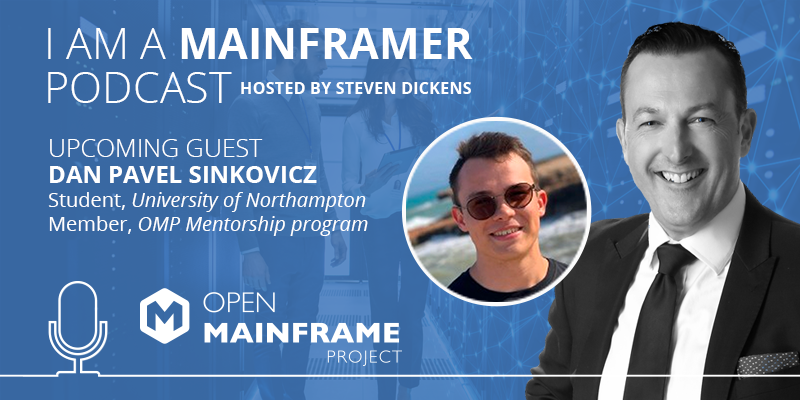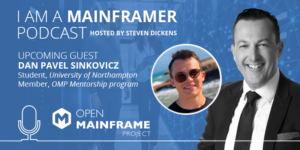
In today’s episode of the “I Am A Mainframer” podcast, Steven Dickens sits down with Dan Pavel Sinkovicz, OMP Mentorship Program Member and Student at the University of Northampton. On this podcast, Dan discusses his journey with the mainframe, the OMP Mentorship Program, and where he sees the Mainframe going in the future.

Steven Dickens: Hello and welcome. My name’s Steven Dickens, and you’re joining us today for the “I Am A Mainframer” podcast, brought to you by the Linux Foundation’s collaborative project, the Open Mainframe Project.
Steven Dickens: I’m joined today by Dan Pavel Shinkowitz, who’s going to talk to us a little bit about what he’s been doing on the Open Mainframe Project internship program.
Steven Dickens: Welcome to the show, Dan.
Dan: Thank you.
Steven Dickens: So, Dan, it’s great to have you on the show. We always start these by giving the listener a little bit of an explanation of your background, what you’ve been doing. And when I looked at your bio, I thought it was really good to share this with the group. So maybe if you can start by just giving us a background and a bit of an introduction to yourself.
Dan: So I am Romanian, but I studied in the UK at the University of Northampton. So I stumbled upon programming and coding when I was in my high school, just by completing an HTML homework a friend had, and now I’m here, I guess.
Steven Dickens: Talk about it. So you’re living in the UK now, Dan, is that correct?
Dan: So right now I’m in Romania, but while the university is going on, I’m in the UK, yes.
Steven Dickens: Fantastic. Northampton’s not far from my home back in the UK. So it’s nice to hear somebody who’s kind of back there. So just tell us about some of those early experiences, if you would, Dan. Tell us kind of how you heard about the Open Mainframe Project internship and what drew you to the platform.
Dan: So I knew I wanted to get a job as fast as possible because I was needed to work in a warehouse and I really liked coding, but I hated working like physical work. So in my first year, I knew I couldn’t get a job because I don’t know much about the programming coding stuff, but I started to search for internships I can get into maybe. And I knew the Linux Foundation had a lot of them. They’re really into bringing new people into Linux and mainframes and stuff like that.
Dan: So I stumbled upon the Opera mentorship, Open Mainframe Project mentorship, and I just applied. It was really easy compared to the other applications I had before. So I knew with experience, I had no chance of being accepted. So I knew I had to go out of my way and make something to get more chances of being accepted.
Dan: And then I just heard about PRs, pull requests. I can make on the data project I will be working for basically, and I did like maybe five PRS before the application deadline. And I just got accepted. So this was the first year. I mean they, the last year, the 2019 edition, 2018. Sorry.
Steven Dickens: So it was your involvement in the community that led to you being selected because you’d got involved and made some pull requests? Is that correct?
Dan: Yeah, I think so, I think so.
Steven Dickens: Okay. Well, I mean, that’s a good story for anybody who’s looking to get involved in these communities. I mean, code talks. I mean, it kind of proves to all of our listeners that the best way to get involved is to get involved.
Dan: Exactly.
Steven Dickens: So you got accepted onto the internship, Dan. Tell us a little bit about what your project was and what you were involved in and what you worked on.
Dan: So the first year was easier than this year, but the first year we had to bring the CF, the cart foundry operator to Z and make some docker images that are compatible with the ZOS but and make some scripts that replace packages inside, I mean zips and stuff like that. And then this year, we’re expanding on the same project, but we want to bring cube CF to Z, and we are really, really close. We are like one error, one bug away. So yeah, that’s really, it’s really frustrating. We can’t get this one working.
Dan: So we had everything working on the Coobernetti’s, but we had one error from Diego. If you know what Diego is, if not, I will explain to you, it’s basically you orchestrate the call with Diego, like, for example, the same as Coobernetti’s, but Diego specific have specific Kali we had no way to get past that error, and we just decided to go for, which is basically the same, but it uses Coobernetti’s instead. And that was much better, and as I said, we are really close to getting it finished, and we’re working on Z.
Steven Dickens: So what’s it been like coming to the platform completely new and seeing Z for the first time? What’s been the experience?
Dan: It was very hard. I was so confused about everything. I mean, everything I’m doing at the university has no similarities with what I’m doing at the mentorship. I had no idea of a command line about Linux, about Coobernetti’s, and I mean, everything. I had to learn everything from scratch. And I think that was really, really difficult, but I can say myself, I adapt easily to new technologies. I can learn very fast.
Steven Dickens: It sounds like you’ve been a couple of years now on the mainframe. What are your thoughts? Most of our listeners have probably got 20 years on the mainframe. What’s your experience with only maybe sort of two years, 18 months on the platform?
Dan: It’s great. I mean, especially the mentor who gives me a great experience, really helps me. The mainframe itself, it’s a no brainer to not use it because it has so, so many, so many advantages to it. I don’t really get why people are not building more applications for it. It has very high security and stuff. So I think that’s a great plus, but that’s why I really want to bring, keep stuff on, on Z. And I think this will open Z to more users and clients.
Steven Dickens: And Dan, lots of students are looking at how they pick their careers. Where do you see yourself going from here? What does the sort of next step look like? Where are you in your college education? And what do you maybe see after that?
Dan: At the moment, I’m into mainframes, but that could change over time. At the moment, I’m working for this internship for the cool CF project. And the last day, I just got accepted into a startup. So yeah, I think that’s good for my future, but in terms of, I like the most at this point I can’t tell. So, yeah.
Steven Dickens: Okay. So then as you’re starting to look at technology, where do you see the platform going, as you’ve learned about the mainframe, where do you see the mainframe platform going in maybe sort of two to three, maybe four years from today, if you had a crystal ball?
Dan: If I mean the open lane, the mainframe is really not knowing them about like few, few people know about the mainframe, and we really need to bring developers, more students into the mainframe, and start building apps for it. And I think the Open Mainframe Project mentorship is a great example of what I’m trying to explain. Cause I had no idea about mainframes two years ago, and now I’m building really great apps on Z.
Steven Dickens: What’s been the reaction of your friends and colleagues when you’ve said you’re working on a mainframe model. What have they said?
Dan: The majority of them had no idea about mainframes that was to be expected, but I tried to explain to them what it was, but they really weren’t that into it. So yeah.
Steven Dickens: Do you think the program, the internship program, is helping spread the word there?
Dan: Yeah, it really is, it really is. I think there were like 150 applicants or something. I mean a lot of applicants compared to last year. So that’s a great thing, seeing more students applying for the OMP mentorship program.
Steven Dickens: What would you say to those people who are thinking of applying for next year? What would be your advice?
Dan: My advice is if I mean if they already know about common lines, Coobernetti’s and stuff, they already use in the project they applied for, that’s a really big plus, but the thing that I think it’s the most important is contributing to the project you are applying for and submitting at least, and maybe for two or three other requests. That way, they can see you really care about the project, and you really like it, that you don’t even need to be paid to do that stuff.
Steven Dickens: So get involved basically would be your advice, just get, get onto, get up, get involved in the project, and contribute.
Dan: Yeah. Yeah. I think that’s the most important stuff.
Steven Dickens: I think that’s really fascinating. I mean, the more I learn about the open source community, the more the meritocracy comes through for me and how people get rewarded for their efforts. And I think the thing Dan, I’m going to take away from this call today is you’ve got involved in the community, and that’s led to you having a fantastic opportunity. And I think if our listeners take one thing from this time together, that’s the message. Would you agree? Would that be your message to people who were looking to get involved?
Dan: Yeah, I completely agree with what I just said. Just get involved. That’s the most important thing. I mean, the most important thing to me as I can say right now.
Steven Dickens: Fantastic. Well, Dan, that’s been really good. I think our listeners will have got a lot from that. I think some really good takeaways. Good to see you getting engaged on the platform. So thank you very much for your time today.
Dan: Thank you. I will like to give my thanks to some people right now that…
Steven Dickens: Go ahead. Yeah. Fantastic. Thank you.
Dan: Yeah, it really helped me out during this mentorship, especially this year, cause I screwed up a lot of times. So the first is May, he was basically the one I was contacting to forward my problems to the people that can resolve them. Then Martha for and the university for providing the VM and the free resources, which is amazing. We, I think it’s pronounced and Mark Fresniger and Bruce Keogh for fixing my mistakes. And lastly, Vlad Ivana, which is my mentor. And I know I can always contact him and he’s really, really great.
Steven Dickens: Oh, fantastic. Well, I’m sure all of those and I recognize some of the names, and I’m sure there’ll be grateful for the shout out on the podcast today, Dan. So thank you very much for your time today. It’s been great chatting, and to our listeners, you’ve been listening to the Open Mainframe Project, “I Am A Mainframer” podcast. Please click on the links below and subscribe and give us your comments and we’ll try and spread this message more widely. And join us next time for the “I Am A Mainframer” podcast.